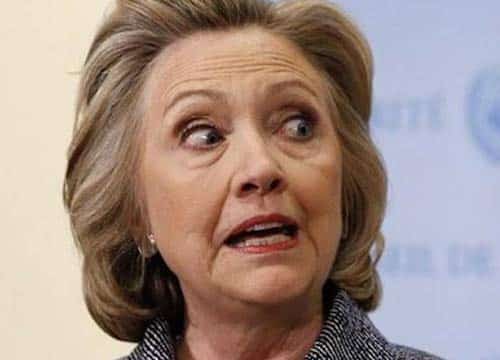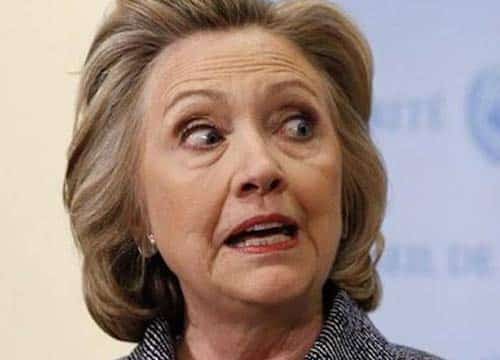The email scandal deepened for former Secretary of State Hillary Clinton on Friday with the announcement that the State Department will not release 22 emails because they contain “top secret” information, the highest level of government classification. The latest batch of emails contains seven email chain with top secret information. While Clinton once insisted that she never sent or received classified information, it is now official that many of the emails did indeed contain classified information. Clinton later argued that she did not send or receive information “marked” as classified.
While many of us in the field noted that such markings are not the only issue for those who handle classified information, the classification level given so many emails will likely increase the criticism of Clinton’s decision to use exclusively her own, unsecure email system over the protected system in place at State. She has insisted that this was done for “convenience” and recently rejected the suggestion that the use of the system showed “an error in judgment.” In the very least, the decision to use a private email system was a horrendously bad decision for a Secretary of State when a secure system was available. It is hardly a compelling argument to advance that you took this reckless step for “convenience.”
Additional emails between President Obama and Clinton were withheld to protect presidential communications, though the use of a private server made such communications vulnerable to foreign interception. Notably, the State Department said today that it has not been established that none of the email information was marked classified.
I have always viewed this scandal as quite serious. Clinton has insisted that “I never sent classified material on my email, and I never received any that was marked classified.” The key of this spin is again the word “marked.” I have previously discussed why that explanation is less than compelling, particularly for anyone who has handled sensitive or classified material. As I discussed earlier, virtually anything coming out of the office of the Secretary of State would be considered classified as a matter of course. I have had a TS/SCI clearance since Reagan due to my national security work and have lived under the restrictions imposed on email and other systems. The defense is that this material was not technically classified at the time that it was sent. Thus it was not “classified” information. The problem is that it was not reviewed and classified because it was kept out of the State Department system. Moreover, most high-level communications are treated as classified and only individually marked as classified when there is a request for disclosure. You do not generate material as the Secretary of State and assume that it is unclassified. You are supposed to assume and treat it as presumptively classified.
Otherwise, there would be massive exposure of classified material and willful blindness as to the implications of the actions of persons disregarding precautions. For example, there is not a person standing next to the President with a classification stamp in the Oval Office. However, those communications are deemed as presumptively classified and are not disclosed absent review. Under the same logic, the President could use a personal email system because his text messages by definition are not marked as classified. Classified oral communications are not “marked” nor would classified information removed from secure systems and sent via a personal server. Likewise, classified oral communications that are followed up with emails would not be “marked.” This is the whole reason that Clinton and others were told to use the protected email system run by the State Department. We have spent hundreds of millions of dollars to secure such systems. Even the Washington Post has now concluded that Clinton’s earlier statements that there was no classified information on her server are “untrue.”
State Department spokesman John Kirby said the documents, totaling 37 pages, were not marked classified at the time they were sent. However, he has said that the information has been flagged as top secret by the Intelligence Community. We discussed earlier that reports indicate that information include human intelligence listed as Special Access Program information.
Two statements today stood out for me. One was from Brian Fallon, a spokesman for Clinton’s campaign, who called this a case of “over-classification run amok.” The only way to reach that conclusion is if Fallon or the campaign was aware of the content of the emails in question. Since they are not cleared to have access to classified information, such statements from the Clinton political team only deepen the problems for the Clinton legal team. I understand that there is a story alleging that some of the top secret material involved an article reporting on the drone program. I have been in cases with such over-classification concerns. However, a Secretary of State is in a position to know whether such journalistic articles are accurate and can authenticate such disclosures in the course of discussing them. Moreover, I fail to see how Fallon or the campaign staff could be so clear about the content and classification of such emails without discussing them or reviewing them — something that would concern most security officers.
The second curious statement came from White House Press Secretary Josh Earnest who told reporters that “based on what we know from the Department of Justice, it does not seem to be headed in that direction.” That would indicate that the Justice Department is giving the White House information on the unfolding investigation. It is problematic that political and media folks at the White House would have such information on a still unfolding investigation where key players like Clinton have not even been interviewed. It is even more concerning for the White House to give effective assurances on the direction of a supposedly confidential criminal investigation. Indeed, the White House should not be commenting on the progress of criminal investigations at all, let alone reference a basis of knowledge of the direction of such investigations.
What is most baffling is Clinton’s reversal in the last debate where she balked at the suggestion that she used bad judgment in the use of her own server despite the fact that she knew she was one of the top targets for foreign intelligence services. She simply repeated that she did it for convenience and it has not proven very convenient. That is hardly a compelling defense when others have been indicted for such mishandling of classified information. It is not a question of convenience but potential criminality that is the obvious concern. Classification rules were designed specifically to prevent people from conveniently skipping security measures. They are inherently inconvenient but necessary.
Even if Clinton is able to avoid a criminal charge, her aides are now in a highly precarious position and should have independent counsel at this point. That does not mean that anyone will be indicted but, as a criminal defense attorney in this field, I would view this situation was potentially dangerous for those involving in transmitting and storing this information. With the FBI now reportedly retrieving the tens of thousands of emails deleted by the Clinton staff, that danger will grow considerably if classified or official records were deleted. It is also dangerous for campaign staff who are dealing with individuals subject to the investigation. The most common charges in such scandals is obstruction or false statements or witness tampering. This is particularly the case when people like Jake Sullivan are now working in the campaign. It is time (if it has not been done before) for Clinton lawyers to create conflict walls and guarantee individual counsel for potential targets.
Reprinted with permission from JonathanTurley.org.


